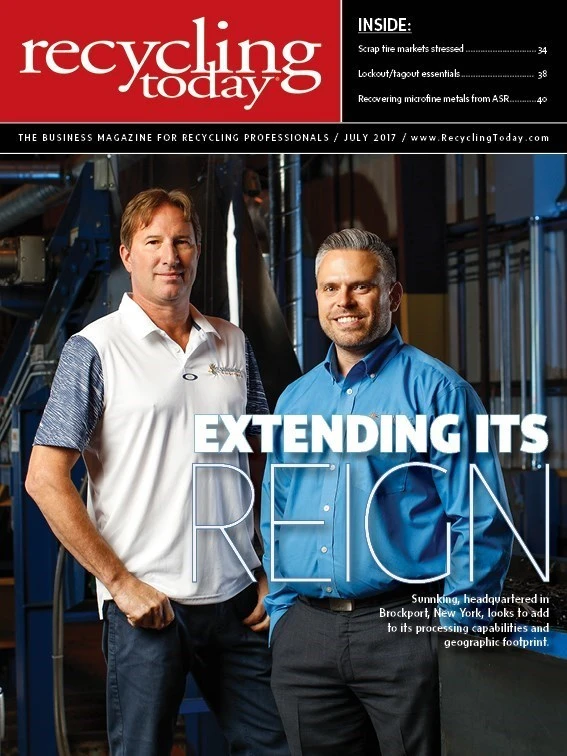Optical sorting helps Ontario county surpass recycling goals

Northumberland County in Ontario installed a Mach Hyspec optical sorting unit on the container line of its material recovery facility (MRF) in 2015, and as of the August 2016 production report, the unit was showing positive numbers, according to a news release issued by Plessisville, Quebec-based
Based on these objectives, the primary focus was to update the processing equipment to optically sort PET, improve safety conditions for employees and reduce operating costs. The county requested 95 percent sorting efficiency on PET and a minimum processing rate of 4 tons per hour for containers. The Mach Hyspec exceeded the targets by reaching an average rate of 97 percent efficiency, Machinex says.
The MRF has increased PET diversion by 66 percent and is showing an annual savings of $360,000.
In addition to diverting more PET, Northumberland has seen an increase in diversion of high-density polyethylene (HDPE) to 8 percent, mixed plastics to 30 percent, aluminum cans to 9 percent and
More tons are recovered and marketed, while labor costs and residual disposal fees have been reduced and injury claims have been eliminated, the supplier says. The overall payback period for the capital investment of this project is 2.5 years.
Hammermills International undergoes ownership change
Kiefer, Oklahoma-based Hammermills International LLC has announced that prior co-owner Marlin Bills now has 100 percent ownership of the company, having bought out his former partner, Tim
Bills
According to a Hammermills International news release,
Bills, now the sole owner, says Hammermills International has a focused mission: “To provide current and future customers with the best possible support in the metal recycling industry.” He says the new ownership structure and consolidation has brought new energy, “which will be evident in our equipment, designs and customer dealings.”
With the change, Bills says, “We have shed some overhead. Hammermills International will no longer offer direct installation services. However, we could, if requested, offer third-party services. We are ‘lean, but not mean’ as we continue to strive for better value and service to our customers.”
He says associated firms London-based Hammermills Ltd. and Alexander’s Machine of Fort Worth, Texas, “are also excited about the change.”
TJM Capital Partners invests in SAS Forks

The Chicago-based private equity firm TJM Capital Partners, through its portfolio company Builtrite Holdings LLC, has announced its investment in SAS of Luxemburg Ltd. effective April 14, 2017.
Founded in 1975, SAS Forks, Luxemburg, Wisconsin, is a leading producer of highly engineered and differentiated auto dismantlers and processors, as well as material handling attachments serving the auto salvage, material recycling, scrap processing and quarrying market niches, among others. The company will operate as a wholly owned subsidiary of Builtrite Holdings and will continue to operate from its modern manufacturing facility in Luxemburg.
Elmer Secker, founder of SAS, will serve as a consultant to the SAS Forks management team. His son Paul Secker will continue to serve as SAS president. All SAS Forks employees will retain their current roles with the company.
Builtrite Manufacturing, also a wholly owned subsidiary of Builtrite Holdings LLC, based in Two Harbors, Minnesota, is a sister company to SAS Forks. Members of the new SAS Forks-Builtrite Manufacturing
Builtrite designs and produces a range of truck-mount and stationary electric material handlers. The company also produces a broad family of attachments for applications on heavy mobile and stationary equipment.
Builtrite was founded as Northshore Manufacturing in the late 1970s by John Anderson and two associates. Anderson currently serves as a consultant to Builtrite Manufacturing’s management team. TJM Capital Partners acquired Builtrite Handlers from Northshore Manufacturing in April 2015.
SAS and Builtrite customers will have access to the full suite of complementary products offered by each company. The company says sales and marketing synergies are anticipated as SAS and Builtrite integrate go-to-market strategies, leverage
Get curated news on YOUR industry.
Enter your email to receive our newsletters.

Explore the July 2017 Issue
Check out more from this issue and find your next story to read.
Latest from Recycling Today
- ReMA opposes European efforts seeking export restrictions for recyclables
- Fresh Perspective: Raj Bagaria
- Saica announces plans for second US site
- Update: Novelis produces first aluminum coil made fully from recycled end-of-life automotive scrap
- Aimplas doubles online course offerings
- Radius to be acquired by Toyota subsidiary
- Algoma EAF to start in April
- Erema sees strong demand for high-volume PET systems






